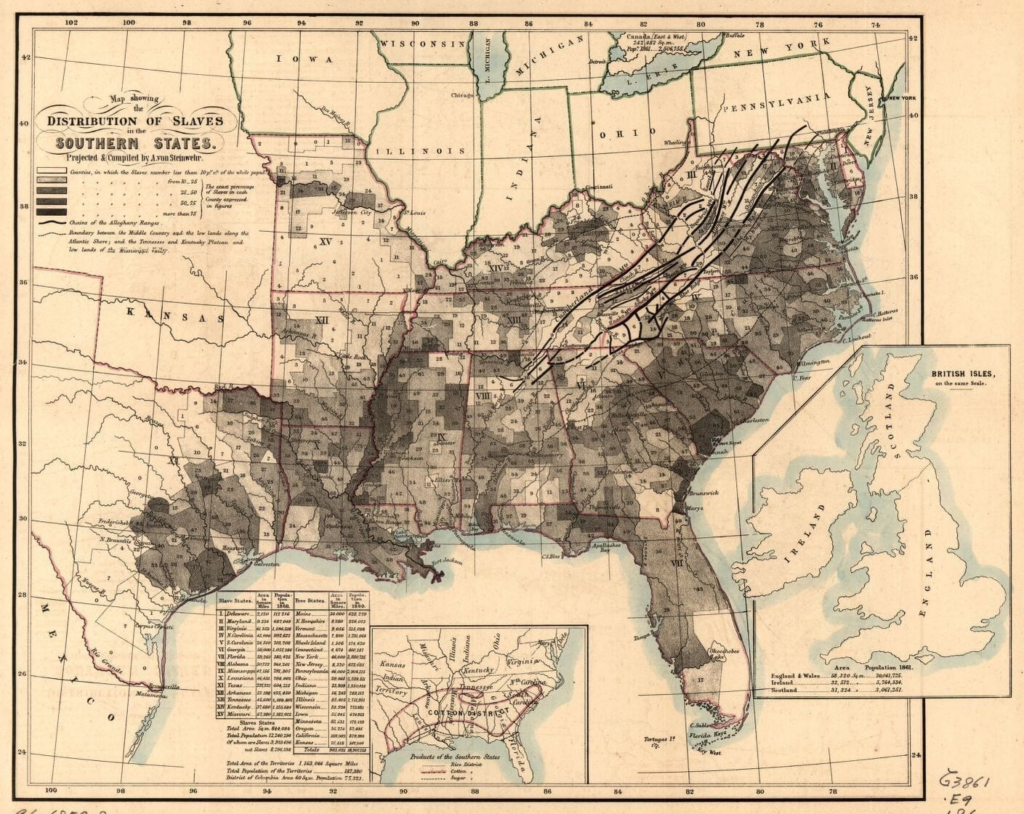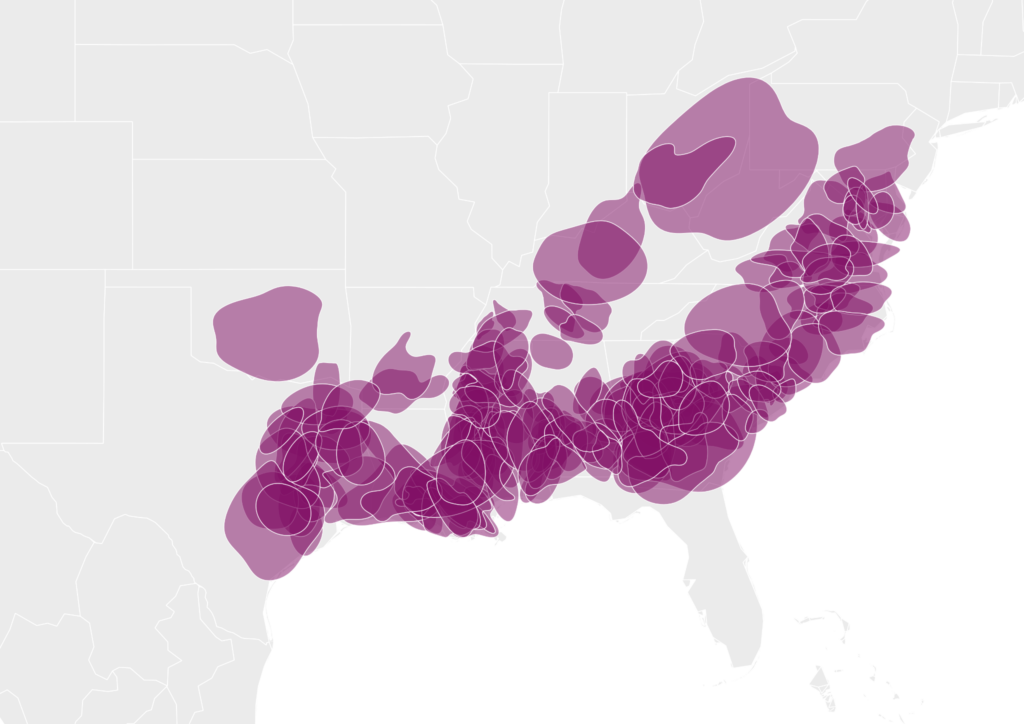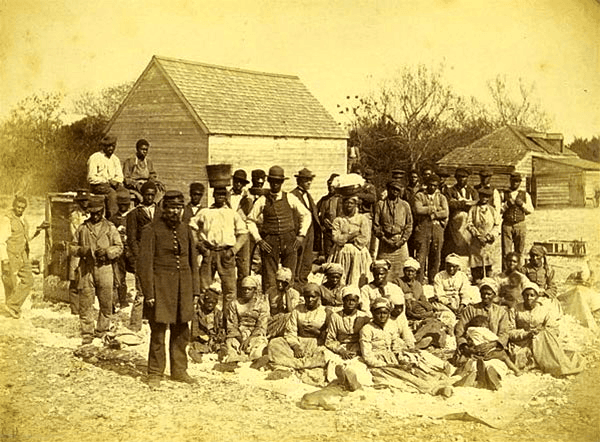History is written in our DNA, and like our DNA, our history is often complicated.
Over the last several years, 23andMe scientists have explored what our genetics can reveal about the people of the United States and our complicated history with race.
Leveraging many of these insights and ongoing improvements to our ancestry service features, 23andMe released a new feature this week to help people with African American ancestry connect to one of 213 genetic communities of people of African descent in the United States.

This new update offers individuals and families direct connections to communities where their ancestors may have once lived. To understand the significance of these connections, one must know a little about African American history in the United States. Much of that history involves forced migration, often a harsh severing of families from their past. This happened first during the brutal history of slavery when people were robbed from Africa and brought to the Americas. (Read more about this feature from someone who worked on it here.)
The Great Migration
It happened again during what is known as the Great Migration in the United States, which lasted from the early to the middle of the 20th Century. According to scholars, about 90 percent of the Black population in the United States lived in the South until 1910.

During the Great Migration, more than six million Black Americans left the primarily rural South in search of economic opportunities and to escape the repression of Jim Crow laws and racial violence. Over the years, individuals and families migrated along a few well-beaten paths to northern and western states.
In her book The Warmth of Other Suns: The Epic Story of America’s Great Migration, Pulitzer Prize-winning author and journalist Isabel Wilkerson describes how transformative the movement of people was not just for individuals and families but also for the political, cultural, and social fabric of the United States. While these migrants still experienced racism, they also helped fuel political and cultural changes in cities like New York, Chicago, Detroit, and Los Angeles.
In her book, Wilkerson notes some of the many iconic figures who either came north with their families or who were born soon after their families migrated north, from the writer Zora Neale Hurston, whose family fled Florida to Baltimore and eventually Harlem, to the Blues musician Muddy Waters who left Mississippi for Chicago, to Jackie Robinson whose mother took him and his siblings from Cairo, Georgia and moved to Los Angeles, to the first Black mayor of that city Tom Bradley, whose family were sharecroppers in Texas before moving him and his siblings to Los Angeles.
While the millions of people who made difficult moves north and west found new opportunities and made new lives, they often remained tied to the communities they left behind, either through family or food.
Reconnecting to Roots
Over the generations, some of those ties to the communities from which families came have weakened, but they’ve never been lost.
There were three broad avenues of migration from these southern African American communities. The first was a well-worn path connecting people who now live in Washington D.C., Baltimore, Philadelphia, New York, and Boston with communities in Florida, Georgia, the Carolinas, and Virginia. Another path connects people now living in St. Louis, Chicago, Cleveland, and Detroit to rural communities in Alabama, Mississippi, Tennessee, and Arkansas. Out west, vibrant Black communities in Los Angeles and Oakland connect to towns and parishes in Louisiana and Texas.
Beginning in the 1970s and continuing until the 2000s, some reverse migration has occurred from urban centers. Economic opportunities have driven this more, with people moving not to rural communities in the South but to urban and suburban areas for work and affordable housing.
Rich History of African American Communities
23andMe’s new African American Genetic Groups feature helps those interested in seeing their genetic connections to those rural communities. Many of these communities have a rich history of their own.

23andMe scientists used their Genetic Group analysis pipeline to identify 213 genetic communities of people of African descent in the United States. Based on customer survey answers and geographic representation, scientists inferred that many of these groups correspond to communities formed by the colonial slave trade.
Customers who share enough DNA with a Genetic Group will see this group in their Ancestry Composition report under “Additional Ancestry Regions.” These connections may reflect ancestry as recent as a couple of generations ago or as distant as the 17th Century.
Many of these communities are unique, such as the Gullah Geechee, who descended from enslaved Africans brought to work in the coastal low country and Sea Islands of South Carolina, Georgia, and northeastern Florida. The isolation of these communities, especially in the island communities, allowed them to develop their language, a Sea Island Creole, and traditions and cuisine that mix West African, Caribbean, Native American, and Southern influences. Or the Piney Woods Mississippi African American Genetic Group, connected to dense forests and rolling hills in rural Mississippi, a region that was so crucial for the evolution of Blues music. Or the River Parishes and Greater New Orleans Creole Genetic Group, connected to large and small communities along the lower Mississippi that draw on French, Spanish, Native American, and African cultures.
A Broad and a Granular Model
Two models are used to determine connections to these Genetic Groups. One is broad and includes 33 different groups across wide geographic distributions. The second model is much more granular. This typically identifies more recent Genetic Groups at the county or city level. Because it is less likely for a customer to share sufficient DNA with a small granular cluster, fewer customers will get matches to the granular model.
More than a million 23andMe customers—or about 88 percent of the customers identifying as African American—will see connections to one or more of the African American Genetic Groups comprising the broad model. 23andMe+ Premium customers can see more distant matches, so about 95 percent of our African American 23andMe+ Premium customers will get a match. In addition to 23andMe customers who identify as Black, about 5 percent of 23andMe customers who identify as white but may have a small percentage of African ancestry will also see a result. In many cases, these customers may be unaware of their African ancestry. Still, it’s the result of the ugly history of sexual exploitation and rape of enslaved women by their slave owners. Whereas many African Americans are well aware of their mixed ancestry, which often includes European ancestry, many people who self-identify as white but have some “hidden” African ancestry may not know that same history. They are the descendants of individuals who, at some point, likely “passed as white.”
The most common matches will be to the Southern Black Belt African American Genetic Group, which includes Alabama, Mississippi, and parts of Georgia.
About a quarter million 23andMe customers — or about a quarter of 23andMe customers who identify as African American — will see a match to one or more of the more granular African American Genetic Groups. The most common match for these customers includes the Catawba River Basin African American Genetic Group, the African Americans from Anderson, Spartanburg, and Laurens Counties Genetic Group, or the Florida Parishes Creoles Genetic Group.
Find out more
23andMe customers can see their Genetic Groups by going to their Ancestry Composition and clicking through, while 23andMe+ Premium customers can see additional, more distant connections using this feature.
Are you still waiting to be a customer? You can find out more about 23andMe’s Ancestry Service and other services here.
List of Broad Model African American Genetic Groups
- Albemarle Sound African Americans
- Ark-La-Tex Creoles
- Arkansas West Timberlands African Americans
- Avoyelles Parish Creoles
- Central Carolinas Piedmont African Americans
- Central Georgia Piedmont African Americans
- Central Kentucky African Americans
- Chesapeake Bay African Americans
- Creoles of Cajun Country
- Delmarva Peninsula African Americans
- Georgia Coastal Plain African Americans
- Lower Alabama African Americans
- Lower Cape Fear African Americans
- Lower Tar-Pamlico River Basin African Americans
- Maryland Western Shore African Americans
- North Carolina Northern Coastal Plain African Americans
- North Carolina Northern Piedmont African Americans
- North Carolina Western Piedmont African Americans
- Pearl River Basin African Americans
- Pee Dee River Gullah
- Piney Woods, Mississippi African Americans
- River Parishes and Greater New Orleans Creoles
- Savannah River Basin African Americans
- South Carolina Lowcountry Gullah
- South Carolina Piedmont African Americans
- Southern Black Belt African Americans
- Southern Mississippi Pines African Americans
- Southern Plains African Americans
- Upper Cape Fear African Americans
- Virginia and Upper Ohio River Valley African Americans
- Virginia Piedmont African Americans
- Virginia Tidewater African Americans
- Yadkin-Pee Dee Basin African Americans
List of Granular Model African American Genetic
Alabama
- African Americans from Andalusia and Boykin
- African Americans from Crenshaw and Jefferson Counties
- African Americans from Monroe and Escambia Counties
- African Americans from Oak Hill
- African Americans from Opelika, La Fayette and Seale
- African Americans from Pickens and Tuscaloosa Counties
- African Americans from Shelby and Perry Counties
- African Americans from Wilcox County and Mobile Bay
- Central Alabama Prairie African Americans
- Central Alabama River Basin African Americans
- Clarke County African Americans
- Hale County African Americans
- Lower Cahaba Valley African Americans
- Lower Coosa River Basin African Americans
- Lower Tennessee River Basin African Americans
- Lower Tombigbee River Basin African Americans
- Marengo County African Americans
- Mobile-Tensaw Delta African Americans
- Northern Alabama Wiregrass Region African Americans
- Russell County African Americans
- Southern Alabama River Basin African Americans
- Southern Alabama Wiregrass Region African Americans
- Tallapoosa River Basin African Americans
- Upper Pea River Basin African Americans
Arkansas
- Clark County African Americans
- Ouachita County African Americans
Delaware, Maryland, Pennsylvania
- African Americans from Charles and Prince George’s Counties
- African Americans from Frederick, Carroll and Montgomery Counties
- Central Delmarva Peninsula African Americans
- Chesapeake Bay Western Shore African Americans
- Choptank River Basin African Americans
- Northern Chesapeake Bay African Americans
- Northern Delmarva Peninsula African Americans
- Patuxent River Basin African Americans
- Severn River Basin African Americans
- St. Mary’s Peninsula African Americans
Georgia
- African Americans from Bulloch and Effingham Counties
- African Americans from Byron, Ellerslie and Cataula
- African Americans from Conyers, Social Circle and Adairsville
- African Americans from Crawford, Georgia
- African Americans from Greene and Taliaferro Counties
- African Americans from Greensboro, Georgia
- African Americans from Hall, Habersham and Jackson Counties
- African Americans from Hancock and Washington Counties
- African Americans from Houston and Taylor Counties
- African Americans from Jasper and Lamar Counties
- African Americans from Mitchell and Baker Counties
- African Americans from Pike and Meriwether Counties
- African Americans from Preston
- African Americans from Talbot and Harris Counties
- African Americans from Terrell and Randolph Counties
- African Americans from Wadley and Bartow
- Burke County African Americans
- Central Georgia Fall Line African Americans
- Dodge County African Americans
- Georgia Lower Coastal Plain African Americans
- Georgia Suwannee River Basin African Americans
- Gwinnett County African Americans
- Macon County African Americans
- Northern Chattahoochee River Basin African Americans
- Northern Flint River Basin African Americans
- Treutlen County African Americans
- Warren County African Americans
- Wilkes County African Americans
Indiana, Kentucky, Ohio, West Virginia
- Greater Louisville African Americans
- Muskingum River Basin African Americans
- Pennyroyal Plateau African Americans
- Southern Ohio African Americans
Louisiana
- African Americans from Franklin and Lake Providence
- Barataria Bay Creoles
- Coastal Prairie Creoles
- Creoles from St. Landry, Evangeline and Acadia Parishes
- False River Basin Creoles
- Florida Parishes Creoles
- Lafayette Parish Creoles
- Mississippi River Delta Creoles
- Natchitoches Parish Creoles
- Pontchartrain Basin Creoles
- St. Martin Parish Creoles
- Vermilion Parish Creoles
Mississippi
- African Americans from Amite, Pike and Wilkinson Counties
- African Americans from Attala and Noxubee Counties
- African Americans from Benton and Panola Counties
- African Americans from Clarke and Lauderdale Counties
- African Americans from Collins and Laurel
- African Americans from Crawford, Mississippi
- African Americans from Friars Point
- African Americans from Hermanville
- African Americans from Jasper and Smith Counties
- African Americans from Jefferson and Yazoo Counties
- African Americans from Kemper and Neshoba Counties
- African Americans from Lee and Franklin Counties
- African Americans from Leflore and Holmes Counties
- African Americans from Lena
- African Americans from Pinola, Mendenhall and New Hebron
- African Americans from Sharon
- African Americans from Tallahatchie and Jones Counties
- African Americans from Union Church
- African Americans from Vaughan and Silver City
- Harrison County African Americans
- Lower Pearl River Basin African Americans
- Marion County African Americans
- Marshall County African Americans
- Montgomery County African Americans
- Rankin County African Americans
- Simpson County African Americans
- Walthall County African Americans
- Winston County African Americans
- Yalobusha County African Americans
- Yazoo River Basin African Americans
North Carolina
- African Americans from Caswell, Alamance and Chatham Counties
- African Americans from Hollister and Arcola
- African Americans from Wayne and Wilson Counties
- Cape Fear River Basin African Americans
- Catawba River Basin African Americans
- Chowan River Basin African Americans
- Lumber River Basin African Americans
- Martin County African Americans
- Northampton County African Americans
- Northern Sandhills African Americans
- Pamlico Sound African Americans
- Vance County African Americans
Oklahoma
- Central Oklahoma African Americans
South Carolina
- African Americans from Anderson, Spartanburg and Laurens Counties
- African Americans from Darlington and Chesterfield Counties
- African Americans from Edgefield, Saluda and Greenwood Counties
- African Americans from Horry, Marion and Dillon Counties
- African Americans from Scranton, South Carolina
- African Americans from Sumter and Lee Counties
- Berkeley County Gullah
- Charleston and Sea Islands Gullah
- Clarendon County African Americans
- Edisto River Basin Gullah
- Georgetown County Gullah
- Lexington County African Americans
- Southern Lowcountry Gullah
- Wateree River Basin African Americans
- Williamsburg County African Americans
Tennessee
- African Americans from Jackson, Mercer and Denmark
- African Americans from McMinnville and Murfreesboro
- Duck River Basin African Americans
- Franklin County African Americans
- Hardeman County African Americans
- Hatchie River Basin African Americans
- Middle Tennessee African Americans
Texas
- African Americans from Center and Hemphill
- African Americans from East Austin and Giddings
- African Americans from Fayette and Titus Counties
- African Americans from Grapeland, Crockett, and Palestine
- African Americans from Harrison, Smith and Tarrant Counties
- African Americans from Itasca
- African Americans from Lavaca and Gonzales Counties
- African Americans from Matagorda and Wharton Counties
- African Americans from Montgomery and Anderson
- African Americans from Navasota, Huntsville, and Lubbock
- African Americans from Red River and Lamar Counties
- African Americans from Travis and Henderson Counties
- Cass County African Americans
- East Central Texas African Americans
- Freestone County African Americans
- Hopkins County African Americans
- Navarro County African Americans
- Robertson County African Americans
- Rusk County African Americans
- Texas Pine Belt African Americans
- Upshur County African Americans
- Washington County African Americans
Virginia
- African Americans from Brunswick and Prince George Counties
- African Americans from Louisa and Hanover Counties
- African Americans from Nelson, Amherst and Augusta Counties
- Buckingham County African Americans
- Dan River Basin African Americans
- Middle Peninsula African Americans
- Northern Albemarle Sound African Americans
- Northern Neck Peninsula African Americans
- Potomac River Basin African Americans
- Richmond Basin African Americans
- Roanoke Valley African Americans
- Virginia Central Piedmont African Americans
- Virginia Peninsula African Americans




